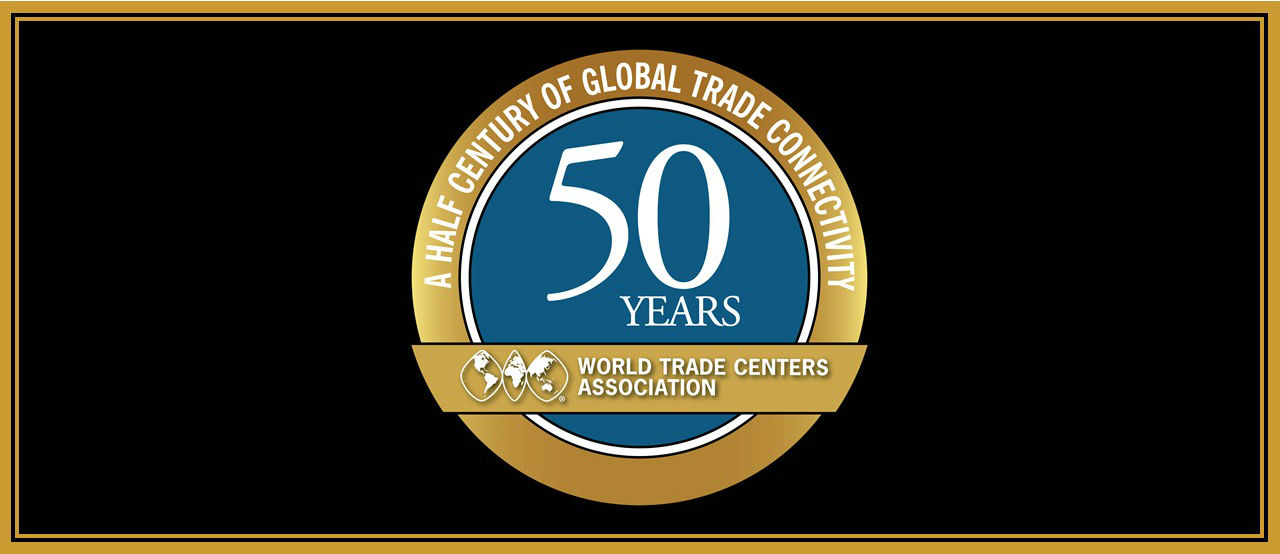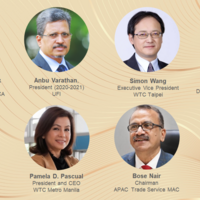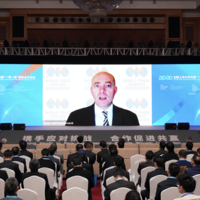The WTCA Editorial Team virtually sat down with the five winners of the inaugural WTCA Champions Awards to discuss their recent achievements and their aspirations for the organization in 2021.
*Champion Award for Member of the Year: Pamela Pascual of WTC Metro Manila
*Champion Award for Connectivity: Cheryl Smith of WTC Las Vegas
*Champion Award for Reciprocity: WTC Dublin (representative Rani Dabrai)
*Champion Award for Network Support: Karen Gerwitz of WTC Denver
*Champion Award for Sustainability: Evert Jan Schouwstra of WTC Leeuwarden
- Congratulations to each of you on your recent achievements as recipients of the inaugural WTCA Champions Awards. Were you surprised by the nominations and how does it feel to win in your respective categories?
Pamela Pascual: To be recognized by my WTC peers and the Association, mean so much to me. And for this award to come during these unprecedented times, makes it all the more special. The magnitude and scale of the most coveted inaugural “Member of the Year” award is definitely overwhelming and I hope that it inspires my co-WTC Members to continue to trailblaze by contributing what is possible for the benefit of their communities and by setting a good example for other WTCs by elevating the quality of work that we all do.
Cheryl Smith: I was shocked and also humbled to know that I was selected by my WTCA peers – I am still blushing. I feel strongly that this recognition is a team achievement, and while I am grateful to be the individual recipient, I share the award with my entire WTC Las Vegas team. Without their talent, determination, creativity and resilience, WTC Las Vegas would not be nearly as successful. Because of our team, combined with our partnership with the Consumer Technology Association (CTA®), WTC Las Vegas was able to offer an innovative opportunity during CES® 2020 for all WTCA Members and their member companies to participate. I hope this model becomes the norm for other WTCs hosting large trade events around the world, and offers a new opportunity for the trade services and business club MACs.
WTC Dublin (Rani Dabrai): In Dublin, we have worked really hard to ensure that we are supporting our fellow WTCA Members with their reciprocity requests. We have leveraged our network to demonstrate the best example of trade services to enhance the offering of our network. Being a trade service-oriented WTC, we felt that it was important to show just how essential reciprocal trade services were to the development of each individual WTC and so — in creating a culture of “Help first” — we have opened doors to lots of exciting new relationships. It is wonderful to get the acknowledgement for the efforts of our team by being recognized as a Champion of Reciprocity.
Karen Gerwitz: I was absolutely surprised by the nomination and grateful for the confidence of my peers. The category of Network Support is the award I was most drawn to and especially honored to receive. I take great pride in our global network and know that by supporting the growth and strength of individual WTCs, it helps our entire network be more relevant and trustworthy for all of the businesses that we serve.
Evert Jan Schouwstra: I was very surprised and proud to have been nominated by my fellow WTCA Members, and, ultimately, it was a great feeling to win the award. I feel that the theme of sustainability that we selected for the 2018 WTCA General Assembly made a great impact on the whole organization, and influenced our win in this specific category.
- 2020 was certainly a tumultuous year felt around the world that continues to carry onto today. What was your WTC’s proudest moment in 2020?
Pamela Pascual: World Trade Center Metro Manila (WTCMM) has been fortunate to be given a chance to play a pivotal role during the most difficult time of the COVID-19 pandemic by allowing our government to use the WTCMM building for public use as a quarantine facility for six months. WTCMM was at the forefront of the Philippine government’s efforts to fight the spread of the virus, giving this CSR effort the much-needed exposure on print and social media. This was the silver lining we faced — with the community lockdown that started in March 2020 that left our exhibition halls empty, and with cancelations of booked exhibitions and events through the end of the year.
Cheryl Smith: One of the things that we are most proud of is that despite the challenges of 2020, the Las Vegas Convention Center (LVCC), which is WTC Las Vegas, was able to move forward with a massive 1.4 million-square-foot West Hall expansion and an innovative new underground transportation system, the Convention Center Loop. The expansion and the Loop are exciting additions for not only our organization, but for Las Vegas as a whole, and this progress is so important because it will help position Las Vegas for the future of successful international meetings and trade events.
WTC Dublin (Rani Dabrai): We felt the uncertainty and turbulence as the chaos of COVID-19 unfolded around the world. In response, we wanted to do as much as possible to counteract the negative effects of the pandemic, and so our actions have been consistently network-centric. In 2020, we worked hard to launch many interesting initiatives, but our proudest moments have been around the times we have been able to collaborate with our fellow WTCA Members. Last spring, we launched our language exchange program with WTC Barcelona – an initiative which led to working with many other WTCs and deepening our relationships. Over the summer, we worked with the MACs to ensure strong participation in the China International Import Expo (CIIE) with our Dublin members and, as a result, we have created many partnership opportunities. By being proactive and fostering strong links across our network, we have been able to shine a light on the power of the WTCA and all it can deliver to our communities.
Karen Gerwitz: WTC Denver’s proudest moment in 2020 was our ability to pivot and transform a decades-long, in-person World Trade Day Conference into a virtual series and our most profitable event ever in just a matter of two weeks. COVID-19 accelerated our need to bring quality programming to our clients in a safe and on-demand format. By transforming our conference into a digital offering, we were also grateful that more than 30 WTCs and 400 attendees participated from across the world in our signature event.
Evert Jan Schouwstra: Throughout 2020, WTC Leeuwarden was working remotely – advising companies and connecting them with potential partners. Within the first two months of the pandemic, we altered our organization to operate nearly 100% online. We started offering webinar programs with fellow WTCs around the world, which resulted in a total of 18 webinars in 2020, with many more to come this year. We also launched a podcast series called “EXPORTVERHALEN (stories),” interviewing regional exporters, which resulted in a total of 17 in 2020, with more than 20 to come this year; developed blogs and white papers; and organized virtual trade missions. Our efforts over the past year contributed greatly strengthened the positioning of our WTC, increasing our website traffic per week by 10 times. I am very proud of my team for all their hard work.
- Can you share what you/your WTC has planned for this year?
Pamela Pascual: Our mantra in 2021 is to rise and recover. While waiting for exhibitions and events to be allowed to reopen, we have taken this time to review WTCMM’s health and safety plan, ensuring that it conforms with government regulations in observing proper health protocols in staging events, and as part of the day-to-day operations at WTCMM. We feel this is an important element in restoring confidence in our clients and guests to encourage them to visit WTCMM during forthcoming events.
Cheryl Smith: The LVCC/WTC Las Vegas is looking forward to the return of in-person meetings and conventions this year, and throughout the year, we will be celebrating the fact that we now have this beautiful new hall and transportation system to help us usher in a new era of business. In addition to the West Hall expansion, we have been busy establishing and implementing enhanced cleaning and sanitization protocols, and earning GBAC STAR facility accreditation by ISSA: The Worldwide Cleaning Industry Association (the world’s leading trade association for the cleaning industry). It will be thrilling to see all of that preparation put to action as we once again welcome global events and trade shows, and help facilitate business in a wide range of industries.
WTC Dublin (Rani Dabrai): We are working on a number of unique initiatives focused on enhancing global trade opportunities, as well as providing strong education to our members. Our exciting Retail Accelerator program is designed to fast-track the export of fast-moving consumer goods (FMCG) products into the US and we are overwhelmed with demand for it. We are also providing market entry educational programs, allowing our members to learn and understand their potential in foreign markets. We are excited to be doing all of this through partnerships with our fellow WTCs.
Karen Gerwitz: In the spirit of providing on-demand, real-time content for our clients, WTC Denver will expand its Accelerator — called the Global Trade Activator — to walk alongside small businesses in our region from strategy to execution, with the goal of scaling their businesses from domestic to international in the span of four months. WTC Denver will also make great strides in its real estate partnership this year, creating a placemaking campus the entire city will embrace.
Evert Jan Schouwstra: We have quite an intense program this year. For the first half of the year, we will host a webinar every week. We are continuing with our program titled “Promising Cities for International Business” with fellow WTCs; organizing two virtual events called “First Step in Export” and “World Trade Day,” and seven virtual trade missions in cooperation with other WTCs; launching a series of 10 webinars called “Next Step in Export;” and hosting a bi-weekly podcast.
- What words of wisdom would you offer your fellow WTCA colleagues?
Pamela Pascual: Our plans are not our own. No matter how well our plans bode for our businesses, we cannot control what goes on around us. So, we have to take stock of what we can control and use that to rise up, improve and innovate.
Cheryl Smith: I do not feel old enough to offer “words of wisdom,” but I will share this — my success is the result of listening to and learning from others. The WTCA offers immense diversity of perspective and culture, and it has been one of my greatest career opportunities to work with and learn from so many talented people around the world. I am optimistic that through compassion, tolerance and openness, people from diverse cultures can find common understanding and work together for the betterment of humanity. I am proud to work for an organization and a destination that recognizes the beauty of diversity, and values innovation and opportunity for all.
WTC Dublin (Rani Dabrai): We are only as strong as our partners. If we can continue to work together — with a reciprocal mindset and a view to help our fellow Members — we will not only survive but thrive as a network.
Karen Gerwitz: The best form of flattery is when others copy your ideas. When your WTC has created a program, tool or business model that others want to implement, share it freely for the benefit of our network. With a stronger, relevant, and more innovative network, we all win.
Evert Jan Schouwstra: To me, the WTCA is like a family. It is the warmth, trust, respect and time we give and share with each other that makes this family so unique. We listen to each other and respect each other’s opinions, and it is my wish that this family feeling never disappears.
- What role do you think our organization can play in today’s climate?
Pamela Pascual: I think the WTCA has done a remarkable job in adjusting to the needs of the times. The online discussion forums, webinars, and, not to mention, the very successful WTCA Member Forum held this past November have allowed WTCA Members to stay deeply connected like never before. This unprecedented health pandemic is new to all of us, and, being part of a global Association with Members in different parts of the world, makes one feel that we are not alone. Hearing and learning from one another about the various ways of approaching the global situation is, in many ways, comforting.
Cheryl Smith: Las Vegas has always set the gold standard as a leader in hospitality and events, and I believe we will continue to lead in the recovery of in-person global events and trade shows. Las Vegas is resilient, and so is the meetings and convention industry, and we are confident that, not only are people eager to get back to business, but the industry will successfully rebound and continue to grow.
WTC Dublin (Rani Dabrai): We are the only global organization of our kind with a local presence in our business communities which allows business owners to fast track their export journey. As such, in a post-pandemic world where companies need more support than ever before, we are uniquely placed to be able to help them. No other organization in our field is as connected, as developed, and as rich with knowledge and connections. If we can work together to develop these assets, we will be able to meaningfully help our members and develop our own businesses at the same time. We have to work cohesively to bring our global reach into our own back gardens.
Karen Gerwitz: In today’s climate consisting of a global pandemic and subsequent economic crisis, it is more important than ever to rely on a trusted network of professionals. The WTCA has endured 50+ years of economic crises and booms, and “we know people who know people.” Through the network’s virtual trade missions, direct trade support, online content and personal connections, businesses should rely on the tried-and-true support of the WTCA network to further business continuity on the global stage.
Evert Jan Schouwstra: The WTCA is THE example of globalization in business. Our role is to show that people from all different backgrounds can work together. We can set a global standard for other organizations to follow.
- What are your/your WTC’s aspirations for our Association in 2021?
Pamela Pascual: The WTCA must continue to function as a global backbone and facilitate the necessary assistance and support to its Members affected by today’s climate through constant communication and by continuing to activate Members’ involvement through projects and other various means.
Cheryl Smith: It is my hope that more WTCs will engage both regionally and globally, and participate in all that the WTCA has to offer. It is also my goal as a MAC Chairperson to encourage and promote more WTC participation in integrated MAC activities such as conducting international trade missions with Business Club members in tandem with global trade show events held at member WTCs and creating win-win opportunities for all involved.
WTC Dublin (Rani Dabrai): We hope that we can continue to deepen our relationships and strengthen our network. WTC Dublin will work hard by contributing to the MACs, developing reciprocity and creating business opportunities for our network partners. In this way, we can incrementally build upon our global reputation and help to grow the WTCA network.
Karen Gerwitz: The WTCA should continue to feature relevant content that matters to businesses worldwide in our General Assemblies, featuring nuances of doing business in the host market. Our Member Seminar can focus more on how to effectively run a WTC or feature best practices among the network. We have the perfect storm now during this global pandemic to feature more virtual connectivity through virtual trade missions, online content sharing, and virtual tools to support our clientele. Continue to strengthen global partnerships, create thought leader opportunities for the WTCA’s leadership, and take bold positions on trade topics that matter to the network.
Evert Jan Schouwstra: I think the way we, as a network, work together and respect each other regardless of background, religion and race is a great example for international business and relationships. Our Association should continue to promote these values on a global scale.
Congratulations to all the winners and nominees of the inaugural WTCA Champions Awards. We look forward to kicking off the next iteration of the awards program later this year – stay tuned for more information.

Pamela Pascual (WTC Metro Manila): Champion Award for Member of the Year

Cheryl Smith (WTC Las Vegas): Champion Award for Connectivity

WTC Dublin: Champion Award for Reciprocity

Karen Gerwitz (WTC Denver): Champion Award for Network Support

EJ Schouwstra (WTC Leeuwarden): Champion Award for Sustainability
















